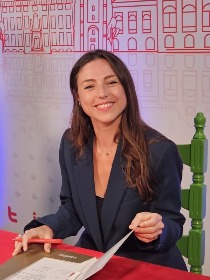Introducing Dr. Sven Kilian, Assistant Professor in Sustainable Entrepreneurship

Dr. Sven Kilian is Assistant Professor in the MSc Sustainable Entrepreneurship. In this blog post, we ask him about his expertise, personal connection to the topic, subjects taught and his take on the uniqueness of our programme.
Hi Sven, thanks for dedicating us some time. Let's start broad: What is your academic background and expertise?
My academic background mostly consists of a combination of business management and psychology topics. After my studies in business administration, I did my PhD in Marketing, where I delved into the psychological processes that promote or hinder the adoption of more sustainable consumer behaviours. After that, I have widened my focus to more general individual & societal well-being (e.g., happiness, social innovations).
What specific subject(s) do you teach?
In the MSc. Sustainable Entrepreneurship I teach three courses altogether.
The first one is the course Strategy which combines important insights about how to successfully conduct sustainable entrepreneurship (e.g., start-ups, organizational change) with direct practical application in the form of student projects.
The second course is Context and addresses how circumstantial aspects (e.g., special factors, organization) influence sustainable entrepreneurship and vice versa. It enables students to analyze and respond to varying circumstances they inevitably encounter as future sustainable entrepreneurs.
The third course is a newly developed one and is called New Economic Realities. It provides a big picture where new economic models and ideas with processes and structures that focus more on actual well-being instead of mere economic growth are scrutinized.
Accompanied by plenty of debating sessions, after this course students are perfectly equipped to evolve and defend their own perspectives for an economic reality they commit to and to which as sustainable entrepreneurs they actively contribute.
What inspired your involvement in the field of Sustainable Entrepreneurship?
Actually, it was my own behaviour that spurred my interest in sustainability at the time of my master’s around 2013. I had a lot of information from the news and documentaries about all kinds of systematic environmental and social problems that are related to our individual everyday behaviour. However, I recognized that all this information not really affected my own behaviour. So, I started to wonder why is that?
I soon found out that there is a large portion of people who were just like me - trapped within this kind of knowledge-behavior-gap. So, I dedicated my master thesis and PhD to investigate what is going on in peoples mind when they make decisions that have environmental and broader social implications (e.g., deciding between a cheaper gray energy contract and a more expensive green energy contract).
With this I naturally affiliated with sustainable entrepreneurs of all kinds and sorts (sustainable businesses, consumer policy, NGO’s) since my findings were targeted to better equip them to close this gap and lever a broader base of people for sustainable behaviours.
In your opinion, what sets our programme apart and makes it particularly appealing to students?
I think one particular strength of this programme is that it makes students fit for how business and economy more broadly will be done in the future.
Most business studies are still trapped within the traditional logics of profit maximization and endless growth potentials with little room for genuine and human centered purpose. So, this programme opens the minds of students for new business logics, logics that are more oriented towards broader societal well-being - a true purpose.
To this end, students are being engaged with a combination of important insights from fields of more traditional entrepreneurship and insights from emerging research strands as well as practical examples that inform news ways for doing business in a future economy.
About the author

Ciao! My name is Erika and I am the Content & Data Management Specialist of Campus Fryslân. I was born and raised in Italy and have recently graduated from the MSc in Climate Adaptation Governance. I have been in charge of the blog and all its content since October 2023. My aim is to make this virtual space serve as a logbook for the Campus Fryslân community and as a welcoming introduction for all newcomers. Here, you will find stories from the people of Campus Fryslân to get a taste of what studying here is like and the exciting opportunities it comes with!

